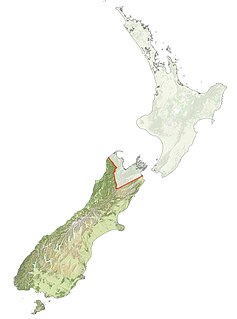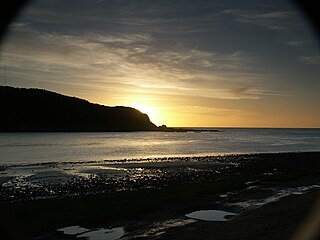Related Research Articles

The Rātana movement is a church and pan-iwi political movement founded by Tahupōtiki Wiremu Rātana in early 20th-century New Zealand. The Rātana Church has its headquarters at the settlement of Rātana Pā near Whanganui.

Ngāi Tahu, or Kāi Tahu, is the principal Māori iwi (tribe) of the South Island. Its takiwā is the largest in New Zealand, and extends from the White Bluffs / Te Parinui o Whiti, Mount Mahanga and Kahurangi Point in the north to Stewart Island / Rakiura in the south. The takiwā comprises 18 rūnanga corresponding to traditional settlements.

Ngāti Toa, Ngāti Toarangatira or Ngāti Toa Rangatira, is a Māori iwi (tribe) based in the southern North Island and in the northern South Island of New Zealand. Its rohe extends from Whanganui in the north, Palmerston North in the east, and Kaikoura and Hokitika in the south. Ngāti Toa remains a small iwi with a population of only about 4500. It has four marae: Takapūwāhia and Hongoeka in Porirua City, and Whakatū and Wairau in the north of the South Island. Ngāti Toa's governing body has the name Te Rūnanga o Toa Rangatira.
Tungia Dorothea Gloria Baker was a New Zealand actor, weaver, and administrator. Her notable acting roles included Ngahuia in the 1980s television drama Open House and Hira in the 1993 film The Piano. Baker was influential in contemporary Māori theatre, Māori film making and Māori arts. She named the Taki Rua Theatre, and was a founding member of Māori artists' collectives Te Manu Aute and Haeata.
Ngāti Raukawa is a Māori iwi with traditional bases in the Waikato, Taupo and Manawatu/Horowhenua regions of New Zealand. In 2006, 29,418 Māori registered their affiliation with Ngāti Raukawa.

Ngāti Kahu is a Māori iwi of Northland, New Zealand. The iwi is one of the six Muriwhenua iwi of the far north of the North Island. Ngāti Kahu take their name from their founding ancestress, Kahutianui, and link their ancestry back to the waka Māmaru. The captain of Māmaru was Te Parata who married Kahutianui.

Hone Vivian Kouka is a New Zealand playwright. He has written 13 plays, which have been staged in New Zealand and worldwide including Canada, South Africa, New Caledonia and Britain. Kouka's plays have won multiple awards at the Chapman Tripp Theatre Awards, the 'Oscars' of New Zealand theatre. Kouka has also worked as a theatre director and producer. In 2009, Kouka was appointed a Member of the New Zealand Order of Merit, for services to contemporary Māori theatre.
Nancy Brunning was a New Zealand actress, director, and writer who won awards in film and television and made a major contribution to the growth of Māori in the arts. Brunning was of Māori descent from the tribes of Ngati Raukawa and Ngai Tuhoe. She won the best actress award at the New Zealand Film Awards for her lead role in the film What Becomes of the Broken Hearted? (1999), the sequel to cult classic Once Were Warriors. In 2000, she won the Best Actress in Drama award at the New Zealand Television Awards for her lead role in the television series Nga Tohu. She was the acting coach for the Oscar-nominated short film Two Cars, One Night directed by Taika Waititi. According to friend and frequent collaborator Temuera Morrison, she "paved the way" for Māori actors in New Zealand.
Riwia Brown is a New Zealand playwright. She is the screenwriter of the popular and award-winning New Zealand movie Once Were Warriors (1994). The Once Were Warriors screenplay, adapted from the book of the same name by Alan Duff, gained Brown the Best Screenplay award at the 1994 New Zealand Film and TV Awards. Brown has written for theatre, television and films.
Ngāti Te Wehi is a Māori iwi (tribe) based in Kawhia on the west coast of New Zealand's North Island.
Mīria George is a New Zealand writer, producer and director of Māori and Cook Island descent. Best known for being the author of award-winning stage plays, George has also written radio, television and poetry, and was one of the film directors of the portmanteau film Vai. In November 2005, she won the Emerging Pacific Artist's Award at the Arts Pasifika Awards. Mīria George was the first Cook Islands artist to receive the Fulbright-Creative New Zealand Pacific Writer's Residency at the University of Hawaii.
Rotoiti is a settlement on the shore of Lake Rotoiti, in Rotorua Lakes within the Bay of Plenty Region of New Zealand's North Island.
Roma Potiki is a New Zealand poet, playwright, visual artist, curator, theatre actor and director, as well as a commentator on Māori theatre. She is of Te Rarawa, Te Aupōuri and Ngati Rangitihi descent. As well as being a published poet, her work is included in the permanent collection of the Dowse Art Museum.
Taki Rua is a theatre organisation based in Wellington, Aotearoa / New Zealand that has produced many contemporary Māori theatre productions. Taki Rua has been going since 1983 and has had several name changes over that time including The New Depot, Depot Theatre and Taki Rua / The Depot. The full current name is Taki Rua Productions. Since inception the mission of Taki Rua has been to showcase work from Aotearoa. Because of this and the longevity of Taki Rua many significant New Zealand actors, directors, writers, designers and producers have part of the history including Riwia Brown, Nathaniel Lees, Rachel House and Taika Waititi.
Kilimogo Productions is bicultural theatre collective based in Ōtepoti Dunedin that was founded in 1995 or 1996.
Rob Mokaraka is a New Zealand playwright and actor. He affiliates to Nga Puhi and Ngai Tuhoe.
Waiora Te Ūkaipō - The Homeland is a 1996 play by New Zealand playwright Hone Kouka. The play describes the social dislocation that happens to Māori who leave their tribal lands. It is the first part of a trilogy with Homefires (1998) and The Prophet (2004), and the teenagers of The Prophet are the children of Waiora's Amiria, Rongo and Boyboy.
Miriama McDowell is a New Zealand actor, director and playwright of Māori descent. She is a graduate of Toi Whakaari.
Jason Te Kare is a New Zealand director, playwright and actor.
Tawata Productions is contemporary Māori and Pasifika performing arts company established in 2004 based in Te Whanganui-a-Tara (Wellington), New Zealand. They produce theatre, screen and digital work as well as the festivals: Kia Mau, Breaking Ground and the Pūtahi Festival. Tawata showcases work by Māori, Pasifika and Indigenous writers and makers and is led by Hone Kouka and Mīria George.
References
- 1 2 3 4 Hone Kouka (1994). Nga Tangata Toa: The Warrior People. Wellington: Te Herenga Waka University Press. ISBN 0-86473-278-3. OL 1235357M. Wikidata Q106815726.
- 1 2 3 4 5 David Carnegie; David O'Donnell (2007). Māori Dramaturgy: The Case of Nga Tangata Toa. Performing Aotearoa. City of Brussels: Peter Lang. p. 466. ISBN 978-90-5201-359-6. ISSN 1376-3199. Wikidata Q107053811.
- 1 2 "Theatre Aotearoa database". Theatre Aotearoa (University of Otago). Archived from the original on 28 January 2021. Retrieved 1 June 2021.
- ↑ Halba, Hilary (1999). "Theatre - Negotiating the bi-cultural tightrope: thoughts on Bi-cultural theatre practice in Te Waipounamu". DeepSouth. Archived from the original on 16 January 2021. Retrieved 1 June 2021.
- ↑ School of Performing Arts. "Hilary Halba". www.otago.ac.nz. Archived from the original on 22 May 2021. Retrieved 1 June 2021.
- ↑ "Production information: Nga Tangata Toa". www.theatreview.org.nz. Archived from the original on 14 May 2021. Retrieved 31 May 2021.
- 1 2 3 "Nga Tangata Toa - the warrior people - When will we ever learn?". www.theatreview.org.nz. Archived from the original on 14 May 2021. Retrieved 31 May 2021.
- ↑ "The Return Of A New Zealand Masterpiece | Scoop News". www.scoop.co.nz. 13 September 2006. Archived from the original on 2 June 2021. Retrieved 31 May 2021.
- ↑ "Nga Tangata Toa - the warrior people - Fiery forces". www.theatreview.org.nz. Archived from the original on 13 May 2021. Retrieved 31 May 2021.
- 1 2 "Nga Tangata Toa - the warrior people - Screaming out for atmosphere and menace". www.theatreview.org.nz. Archived from the original on 13 May 2021. Retrieved 31 May 2021.